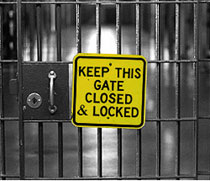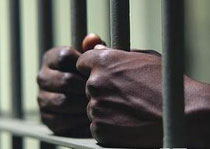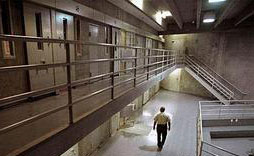影片對(duì)白 You said it yourself: it's impossible. Listen, man, I'm telling you, one of us has got to take a hike.
人物 溫特沃斯·米勒:艱苦的成名路
考考你 一展身手
文化面面觀
Prisoners' Rights in the U. S.美國(guó)監(jiān)獄中犯人的權(quán)利
看《越獄》這部電視劇,很多人一定會(huì)對(duì)美國(guó)監(jiān)獄中犯人的權(quán)利感到驚奇,比如在放風(fēng)的時(shí)候可以隨便打電話、可以去教堂做禮拜、享受免費(fèi)醫(yī)療等等。那么,囚犯?jìng)冊(cè)诿绹?guó)監(jiān)獄中究竟享有什么樣的權(quán)利呢?下文為我們展示了一些美國(guó)監(jiān)獄中的情況。
 Prisoners' rights are limited. For the most part, jail and prison inmates may demand only a "minimal civilized measure of shelter" (Union County Jail Inmates v. DiBuono, 713 F.2d 984 [3d Cir. 1983]). Generally, courts follow three basic principles when deciding whether to recognize a particular right. First, an inmate necessarily gives up many rights and privileges enjoyed by the rest of society; second, an inmate does not relinquish all constitutional rights upon placement in prison; and third, the constitutional rights retained by the prison inmate must be balanced against the security concerns of the prison.
Prisoners' rights are limited. For the most part, jail and prison inmates may demand only a "minimal civilized measure of shelter" (Union County Jail Inmates v. DiBuono, 713 F.2d 984 [3d Cir. 1983]). Generally, courts follow three basic principles when deciding whether to recognize a particular right. First, an inmate necessarily gives up many rights and privileges enjoyed by the rest of society; second, an inmate does not relinquish all constitutional rights upon placement in prison; and third, the constitutional rights retained by the prison inmate must be balanced against the security concerns of the prison.
The established rights of prison inmates include freedom of speech and religion; freedom from arbitrary punishment (i.e., restraints, solitary confinement) on the sole basis of beliefs, religion, or racial and ethnic origin; freedom from constant physical restraints; a small amount of space for physical movement; essentials for personal hygiene and opportunity to wash; clean bedding; adequate clothing; adequate heating, cooling, ventilation, and light; and adequate nutrition.
Prisoners' rights can be infringed for security purposes. Prisoners have the right to freedom of speech, but prison officials may search their mail, deny a wide variety of reading materials, and edit the content of prison newspapers. Prisoners have the right to adequate space, but they may be confined in isolation for long periods, even years. Prisoners have the right to freedom from restraints, but their ankles and wrists may be shackled when they are moved. They may also be temporarily strapped down or otherwise restrained if officials believe that they present a danger.
Prison inmates often attempt to establish new rights in court. Issues such as prison overcrowding, medical treatment, media access, even exposure to secondhand cigarette smoke, are among the issues courts face.
 Another sensitive issue in prison is the use of prison guards of the opposite sex. Women prisoners may receive more privacy in this regard than men prisoners. For example, the Ninth Circuit Court of Appeals held in 1985 that the practice of assigning female guards to conduct strip searches on nude men and watch them while showering, urinating, and defecating did not violate any constitutional rights (Grummett v. Rushen, 779 F.2d 491 [1985]). However, in 1993, the same court held that it was cruel and unusual punishment to allow male guards to conduct searches on female prisoners while the female prisoners were clothed (Jordan v. Gardner, 986 F.2d 1521 [9th Cir. 1993]).
Another sensitive issue in prison is the use of prison guards of the opposite sex. Women prisoners may receive more privacy in this regard than men prisoners. For example, the Ninth Circuit Court of Appeals held in 1985 that the practice of assigning female guards to conduct strip searches on nude men and watch them while showering, urinating, and defecating did not violate any constitutional rights (Grummett v. Rushen, 779 F.2d 491 [1985]). However, in 1993, the same court held that it was cruel and unusual punishment to allow male guards to conduct searches on female prisoners while the female prisoners were clothed (Jordan v. Gardner, 986 F.2d 1521 [9th Cir. 1993]).
Prisoners retain some rights aside from those concerning living conditions. Most prisons "classify" prisoners and place them in various units according to the categories. For example, violent criminals and persons suspected of gang affiliations are often housed in high-security areas of prison, separate from the rest of the general prison population. When an inmate is reclassified, he or she is entitled to notice of the reclassification and a citation of reasons for the move.
Congress and most states authorize the allowance of "good time" for prison inmates. Good time is credit for time served on good behavior, and it is used to reduce sentence length. For example, an inmate may receive one day of good time credit for every three days that he behaves well. Other states withhold recognition of good behavior until the defendant has served a certain portion of the minimum sentence imposed by the court. In New Hampshire, for example, an inmate may be released for good behavior after serving two-thirds of the minimum sentence (N.H. Rev. Stat. Ann. § 651-A:12 [1983]). When an inmate has good time credits taken away, she or he is entitled to notice, a hearing before the prison board, and an opportunity to present evidence in her or his favor.
 Inmates may also gain early release from prison through parole, which is granted by the parole board. Prisoners have no right to parole, and the matter of early release is left to the graces of the parole board. Once released on parole, a parolee may be returned to prison for breaking one of the many conditions that are normally imposed. A parolee has no right to an attorney at a parole revocation hearing, nor does an inmate have the right to an attorney at a parole hearing.
Inmates may also gain early release from prison through parole, which is granted by the parole board. Prisoners have no right to parole, and the matter of early release is left to the graces of the parole board. Once released on parole, a parolee may be returned to prison for breaking one of the many conditions that are normally imposed. A parolee has no right to an attorney at a parole revocation hearing, nor does an inmate have the right to an attorney at a parole hearing.
Solitary confinement is used in many prisons for violent inmates and those inmates perceived as having gang-related affiliations. Some prisons are designed specifically for it. The original prisons, as envisioned by the Quakers, called for solitary confinement, but the practice was halted because of the detrimental effects it had on prisoners. However, the practice never completely ended. In the 1980s solitary confinement became a regular feature of prisons, and it has become the sole form of incarceration in so-called Security Housing Units or Supermax prisons.
In a Supermax prison, the cells are eight-by-ten feet and windowless. The cells are grouped in "pods." The cell doors are perforated with holes large enough for guards to see inside the cell, but small enough to obstruct the prisoner's vision and light. All a prisoner can see through the door is another white wall. Each cell is furnished with a built-in bunk with a toilet-sink unit. Nothing is allowed on the walls. Prisoners may be allowed television, radio, and books, but these are taken away as punishment for any rule infractions.
 Prisoners in solitary confinement are kept in their cells, under surveillance, for twenty-two-and-a-half hours a day. Unlike the rest of the prison population, inmates in solitary confinement may not take advantage of educational or recreational programs. The ninety minutes outside the cell may be divided between visiting a small library, washing, and exercising in a pen connected to the pod. Prisoners are strip-searched by the guards before and after visiting any place and are placed in waist restraints and handcuffs when being escorted.
Prisoners in solitary confinement are kept in their cells, under surveillance, for twenty-two-and-a-half hours a day. Unlike the rest of the prison population, inmates in solitary confinement may not take advantage of educational or recreational programs. The ninety minutes outside the cell may be divided between visiting a small library, washing, and exercising in a pen connected to the pod. Prisoners are strip-searched by the guards before and after visiting any place and are placed in waist restraints and handcuffs when being escorted.
The assignment of a prisoner to solitary confinement is made by prison officials. In assigning supposed gang members to solitary confinement, it is the policy in some prisons to require that the perceived gang member "debrief" officials on his or her gang activity and renounce his or her gang affiliations before being released back into the general population.
One of the most important rights possessed by prison inmates is access to the courts through habeas corpus petitions. After an inmate has exhausted all the motions and appeals available to contest the conviction and prison sentence, a final round of limited judicial review is provided through the writ of habeas corpus. Through the ancient writ of habeas corpus, a court may order the release of a prisoner wrongly held.
Habeas corpus petitions are granted only for certain constitutional violations in the prosecution of a criminal defendant. The Anti-Terrorism and Effective Death Penalty Act of 1996, 28 U.S.C.A. § 2261 et seq., placed certain limits on this form of relief.